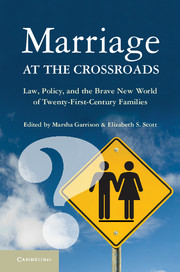Introduction
Published online by Cambridge University Press: 05 November 2012
Summary
Today, marriage is at a crossroads. Across the industrialized world, young adults are marrying later and increasing numbers may not marry at all. Married couples, for several decades now, have also faced a relatively high probability that their relationships will terminate in divorce. These changes have affected children as well as adults. The proportion of children born outside of marriage has grown dramatically, and children born within marriage face an increased risk of parental divorce or separation. Moreover, marriage itself has changed in important ways, from a lifelong institutional union to a companionate relationship, the strength and duration of which are determined by the individual preferences of the parties. Public attitudes toward these trends are generally accepting; a majority of Americans in a recent survey were positive or neutral about couples (including gay couples) living together and having and raising children outside of marriage.
Interestingly, as traditional marriage has declined, the movement to extend the right to marry to same-sex couples has acquired substantial momentum and become an important focus for advocates in the gay and lesbian community. A number of nations and several American states have legalized same-sex marriage; others have created an alternate status that confers some or all of the rights and obligations of marriage. This issue has generated controversy. Those who favor extending marriage to same-sex couples see marriage as a core social status, access to which is an essential aspect of full membership in society. Social conservatives who favor an alternate status – or no status at all – agree that marriage is a core social institution, but argue that extending access to same-sex couples will irreparably weaken marriage. At the same time, some gay and lesbian advocates argue that marriage is a gendered and outmoded institution and that the gay community should not make the right to marry a key political goal.
- Type
- Chapter
- Information
- Marriage at the CrossroadsLaw, Policy, and the Brave New World of Twenty-First-Century Families, pp. 1 - 6Publisher: Cambridge University PressPrint publication year: 2012



